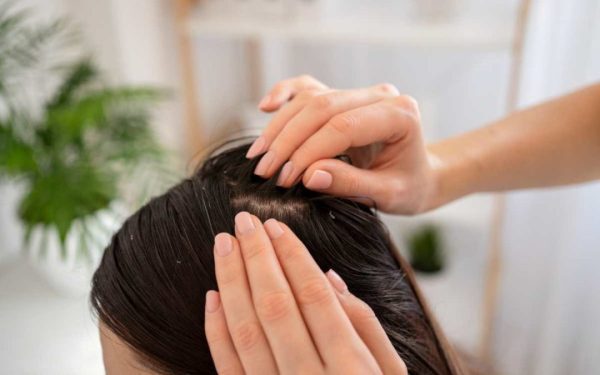
Hair Scalp Treatment
It’s important to remember that scalp health is just as important as the appearance and health of our hair strands. The scalp is a vital foundation for growing healthy hair, so it’s crucial to take care of any scalp issues in order to keep your hair looking vibrant. Dryness and dandruff, as well as excess oiliness and irritation, can all cause scalp problems. In this article, we will discuss the significance of hair scalp treatment, various scalp problems that people commonly face, and effective treatments that can help improve scalp health and enhance hair growth
Importance of Scalp Health
The scalp contains thousands of hair follicles and is important for the growth and upkeep of healthy hair. When your scalp is well-nourished, it creates the perfect conditions for your hair follicles to grow healthy and strong. This leads to hair that is stronger, shinier, and more resilient. Moreover, maintaining a healthy scalp has several benefits such as regulating oil production, preventing dandruff and other scalp conditions, and reducing the risk of hair loss.
Common Scalp Issues
There are various reasons why people may experience scalp issues. These can include things like environmental factors, lifestyle choices, and underlying health conditions. Common scalp concerns that people often experience include:
Dry scalp: Caused by insufficient moisture in the epidermis, dry scalp is characterized by flakiness, itching, and tightness. It happens when the skin doesn’t have enough moisture. Dryness can be worsened by factors like cold weather, harsh hair products, and dehydration.
Dandruffs: This is a common scalp problem where dead skin cells shed excessively quickly, leaving behind white or yellow flakes on the head and hair. There are several factors that can cause it, such as fungal overgrowth, stress, and hormonal imbalances.
Oily Scalp: If your scalp tends to get oily, it means that your body is producing too much oil, which is also called seborrhea. This can result in having an oily scalp, greasy hair, and a higher chance of developing acne and scalp infections. There are a few factors that can contribute to oiliness, such as hormonal fluctuations, genetics, and overwashing.
Scalp Irritation: Scalp irritation can manifest as redness, sensitivity, burning, or stinging sensations. It may be caused by allergic reactions to hair products, chemical treatments, or environmental factors such as pollution and UV exposure.
Hair Loss: Hair loss is not directly a scalp issue, but the health of the scalp can have an impact on it. There are certain conditions that can affect the scalp and cause hair thinning or bald patches. Some examples include alopecia areata, pattern baldness, and telogen effluvium.
Effective Hair Scalp Treatments
There are many treatments you can try to improve the health of your scalp and address common scalp issues. These treatments include topical remedies as well as lifestyle adjustments that nourish the scalp from within. Here are a few effective options you might want to consider:
Scalp Exfoliation: Similar to exfoliating the skin on your face, exfoliating your scalp can assist in getting rid of dead skin cells, excess oil, and buildup from hair products. This can lead to a clean and healthy scalp. You can try using a scalp scrub or a gentle exfoliating brush to massage your scalp in circular motions before shampooing. This can help to remove any buildup and promote a healthier scalp.
Moisturizing Scalp Masks: These scalp masks are made with ingredients like aloe vera, coconut oil, and hyaluronic acid. They can help soothe and hydrate a dry scalp, providing relief from itching and flakiness. Make sure to apply the mask to your scalp and leave it on for the recommended time. After that, remember to rinse it off thoroughly.
Anti-Dandruff Shampoos: There are over-the-counter anti-dandruff shampoos available that contain ingredients like salicylic acid, zinc pyrithione, or ketoconazole. These shampoos can be helpful in controlling dandruff and reducing scalp irritation. Make sure to use these shampoos regularly as directed in order to effectively manage your dandruff symptoms.
Scalp Serums and Tonics: Scalp serums and tonics are designed to address specific scalp issues like thinning hair and hair loss. You should search for products that have ingredients such as minoxidil, peptides, and botanical extracts. These ingredients help to increase blood flow to the scalp and encourage hair growth.
Essential Oils: Essential oils, like tea tree oil, peppermint oil, and rosemary oil, have properties that can help keep your scalp healthy by fighting against microbes and reducing inflammation. You can dilute a few drops of essential oil in a carrier oil and then gently massage it into your scalp.
Nutritional Supplements: Hair loss and poor scalp health can both be caused by nutritional deficits. You might want to think about taking supplements that have vitamins and minerals like biotin, vitamin D, iron, and omega-3 fatty acids. These can help support the health of your hair and scalp.
Lifestyle Changes: Simple lifestyle adjustments like eating a balanced diet, drinking plenty of water, controlling stress, and avoiding harsh hair products and styling methods can have a big impact on the health of the scalp and the growth of hair.
Frequently Asked Question About Hair Scalp Treatment
1. How often should I use scalp treatments?
The frequency of scalp treatments depends on the specific treatment and your scalp’s condition. For example, you can use exfoliating scalp treatments once or twice a week, and you can apply moisturizing scalp masks once a week or as needed. Follow the instructions provided with the product and adjust based on your scalp’s response.
2. Can scalp treatments help with hair growth?
Yes, certain scalp treatments are formulated to promote hair growth by improving scalp health and stimulating hair follicles. Additionally, ingredients like minoxidil, peptides, and botanical extracts can help encourage hair growth by increasing blood flow to the scalp and providing essential nutrients to the hair follicles.
3. Can I use scalp treatments if I have sensitive skin?
When you have sensitive skin or scalp, you must choose scalp treatments that are gentle and formulated for sensitive skin. Additionally, products that are free from harsh chemicals, fragrances, and irritants. Perform a patch test before using the product to ensure it doesn’t cause any adverse reactions.
4. How long does it take to see results from scalp treatments?
The timeline for seeing results from scalp treatments varies depending on the treatment and the individual’s scalp condition. However, some people may notice improvements in scalp health and hair growth within a few weeks of using scalp treatments, while others may require more time. Consistency is key, so continue using the treatment as directed for best results.
5. Can scalp treatments help with dandruff?
Yes, scalp treatments can be effective in managing dandruff by reducing scalp inflammation, controlling excess oil production, and exfoliating dead skin cells. Look for anti-dandruff shampoos and treatments containing active ingredients like salicylic acid, zinc pyrithione, or ketoconazole, which help target the underlying causes of dandruff and relieve symptoms.
6. Are there natural remedies for scalp treatment?
Yes, you can use several natural ingredients for scalp treatment, including tea tree oil, coconut oil, aloe vera, apple cider vinegar, and peppermint oil. These ingredients have antimicrobial, anti-inflammatory, and moisturizing properties that can help soothe the scalp, reduce irritation, and promote a healthy scalp environment.
7. Can scalp treatments help with scalp conditions like psoriasis or eczema?
Scalp treatments may help manage symptoms of scalp conditions like psoriasis or eczema by reducing inflammation, itching, and flakiness. However, it’s essential to consult with a dermatologist for proper diagnosis and treatment recommendations tailored to your specific condition. They may prescribe medicated shampoos, topical treatments, or oral medications to address scalp conditions effectively.
8. Can scalp treatments cause hair loss?
Yes, Scalp treatments formulated with hair growth-promoting ingredients like minoxidil are unlikely to cause hair loss and are, in fact, designed to stimulate hair growth. However, certain scalp treatments may cause temporary shedding or hair loss if they irritate the scalp or if there is an underlying scalp condition. If you experience excessive hair loss or shedding after using a scalp treatment, discontinue use and consult a healthcare professional.
Wrap Up
In conclusion, having a healthy scalp is really important if you want to have strong and vibrant hair. To keep your scalp healthy, make sure to include regular scalp treatments in your hair care routine. Also, don’t forget to address any specific concerns you may have. This will help nourish and balance your scalp, keeping it free from any issues. Try out different treatments to discover what works best for your specific scalp type and concerns. It’s important to be patient because scalp health requires consistent care and time. However, the results will be worth it as you’ll have healthy and beautiful hair.


Leave a Reply